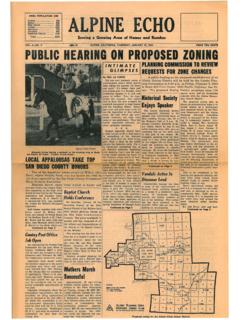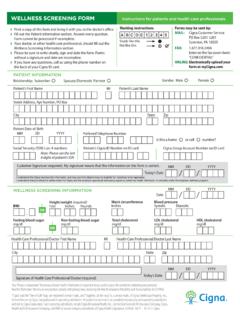Transcription of Memory Clinics in Ireland - Dementia
1 Compiled by Associate Professor Suzanne Cahill, Vanessa Moore, Dr Maria Pierceand updated by Matthew Gibb, Dementia Services Information andDevelopment Centre (DSIDC), St James s Hospital, Clinics inIrelandA Guide for Family Caregiversand Health Service Professionals3rd edition with dementiaContents:Introduction ..4 What is a Memory Clinic? ..5 Numbers and locations of Irish Memory Clinics ..5 How to avail of Memory Clinic services ..6 What information will be asked of clients and their family members at the Memory Clinic assessment?..6Do all people who attend a Memory Clinic receive a diagnosis? ..7At Memory Clinics , what information is given to people worried about theirmemory and those diagnosed with MCI or Dementia ? ..7 What treatments and services are offered at Memory Clinics ? ..8Do Memory Clinics charge patients for their services? ..8 Does attending a Memory Clinic mean being admitted tohospital?..8 Memory Clinics in Ireland .
2 10-26 Location of Memory Clinics in Ireland ..27 Summary ..28 References ..29 Acknowledgements ..29 Authors ..30 Useful Websites ..30 IntroductionAlzheimer s disease and the related dementias have recently been singled out as adomain of increasing importance, globally and at a European level. For example,within the EU, under the European Initiative on Dementia , progress has been madeon mobilising political action on Dementia and several European countries includingNorway, England, Wales, Scotland, and France have already well-developed NationalDementia Strategies or Service Plans. Common to each of these Strategies is a focuson assessment and diagnostic services in future Dementia care reform and anemphasis on the important role that Memory Clinics can play in the early detection,diagnosis, disclosure and treatment of Dementia . In Ireland the government scommitment to developing a National Dementia Strategy and the recent researchreview work undertaken to underpin this will undoubtedly heighten public debateabout preferred approaches to diagnostic services and will shed further light on therole of Memory Clinic services in Ireland in this context.
3 In recognition of the need for information to be more widely available on MemoryClinic services in Ireland , a Memory Clinic booklet was first designed for healthservice professionals and family members in 2010. The aim of the booklet was todetail the location and range of Memory Clinic services available around the countryfor people worried about their Memory or cognitive problems or for familymembers. Since that time further service developments have taken place, includingthe launching of new Memory Clinic services. For this reason the Memory Clinics inIreland booklet is now on its 3rd iteration. 4 What is a Memory Clinic? Memory Clinics are independent Clinics primarily aimed at improving practice in theidentification, investigation and treatment of Memory disorders including employed at Memory Clinics are specially trained to diagnose memoryproblems and to provide people who are concerned about cognitive and memoryproblems with a diagnosis, information, treatment (when necessary) and in Ireland (like other countries), many people with Dementia have never hada formal diagnosis, it is noted that early diagnosis of Alzheimer s Disease or any ofthe related dementias is critical to acquiring appropriate treatments, to managingfinancial and legal affairs (including getting an Enduring Power of Attorney) and toaccessing support services.
4 Early diagnosis also enables the person experiencing thesymptoms to be more proactive in lifestyle decision-making and in planning his orher own future care options. Once a diagnosis is made, treatment can also beinitiated by Memory Clinic staff and advice can be given on a whole range of topicsincluding the use of Memory aids, driving, banking, family matters, employment andleisure time interests. Memory Clinics may also provide post-diagnostic counsellingand emotional support for people newly diagnosed. In Ireland , some Memory Clinicsare actively involved in and locations of Irish Memory ClinicsThere are currently 17 Memory Clinics operating in the Republic of Ireland . Detailsabout each of these Clinics are provided in this booklet. Of the 17 Clinics , seven arelocated in Dublin, four in the South (Cork, Cashel, Carlow and Wexford), three in theMidlands (Robinstown, Portlaoise and Mullingar), one in the West (Mayo), one in theMid West (Co.)
5 Limerick) and another in the North East (Navan). Some parts of thecountry known to support large numbers of people with a Dementia have noMemory Clinics . Kerry, Donegal and Galway, for example, known to have within eachcounty around 2,000 older people with Dementia have no Memory Clinic facilitieswhatsoever. This is despite emerging international and national evidence pointing tothe value of such specialist services. 5 How to avail of Memory Clinic servicesAnyone is entitled to avail of a Memory Clinic service. However, most Clinics onlyaccept referrals from GPs or other medical doctors. Therefore, if you believe thatyour Memory is not as sharp as before and if you are worried about this, you shoulddiscuss the matter with your GP. Your GP may decide that you are worryingunnecessarily or, following a series of tests make a diagnosis of Dementia , or yourGP may decide that further in-depth assessment is needed and may refer you to aMemory Clinic.
6 Memory Clinics cater for people of all ages. The Memory Clinic inClonsilla (Dublin) and the one in Robinstown (Mullingar) are dedicated to peoplewith an Intellectual Disability and have a younger clientele. What information will be asked of clients and their family members atthe Memory Clinic assessment?When an appointment for a Memory Clinic is made, people are usually asked tohave a family member or close friend accompany them. The reason for this is thatthe latter can, if necessary, provide staff with additional information regarding theperson s Memory and cognitive problems and overall health. During the clinicappointment, a series of questions will be asked by clinic staff of the person referredto the clinic. Where appropriate, additional questions will be asked of the familymember. First baseline information is usually sought about the person s generalhealth; the onset of, as well as signs and symptoms of Memory problems; riskfactors for Alzheimer s disease and the related dementias such as smoking, obesity,diabetes, family history and blood pressure.
7 Other information usually soughtincludes that on behavioural/personality changes, educational attainments andliteracy level, physical functioning and activities of daily living. Neuropsychologicalassessment/testing which usually involves a series of questions assessing short-termand long-term Memory , language, orientation, attention, perception and calculationmay also take place. The latter can be brief or may be more in-depth. 6Do all people who attend a Memory Clinic receive a diagnosis?Generally, everybody who attends a Memory Clinic receives feedback on the resultsof the formal assessment. These results may show that there is no organic memoryproblem despite the fact that the person has a subjective Memory complaint, orthat the person has a Mild Cognitive Impairment (MCI), a significant cognitiveimpairment which is not a normal for ones age and education but is not a diagnosisof Dementia , or that the person actually has a Dementia .
8 If a clinical diagnosis isestablished, this will be discussed with the person in accordance with his/her is generally recommended that clinic staff discuss the diagnosis with the person,unless there are clear reasons against doing this. At Memory Clinics , what information is given to people worried abouttheir Memory and to those diagnosed with MCI or Dementia ?Extensive information is provided to people who attend Memory Clinics . The type ofinformation provided typically includes: Ways to improve and maintain cognitive health Clarification of Memory problem symptoms Diagnosis, including differential diagnosis General tips for dealing with possible Memory problems Treatment information such as advice about anti- Dementia drugs and how they work Advice about continuing or not continuing to drive Advice about continuing or not continuing to work Leisure time activities7 What treatments and services are offered at Memory Clinics ?
9 Treatments and services offered at Memory Clinics vary and ideally they should beindividualised to address each person s respective needs. These treatments areusually classified as pharmacological (drugs) or non-pharmacological (no drugs). Insome cases pharmacological interventions such as anti- Dementia drugs(cholinesterase inhibitors) are offered to people in the early stage of Dementia oroccasionally to those with a Mild Cognitive Impairment. These drugs may help toslow down Memory loss or the rate of progression of Dementia but it needs to beremembered that the drugs are not curative and do not tackle the underlying causeof the condition. Anti- Dementia drugs can be effective in the short-term butunfortunately only work in about one third of all cases. A different type of drugcalled Memantine is sometimes offered to people with more advanced Dementia . Non-pharmacological interventions are also often offered through most MemoryClinic services.
10 Such interventions include information, counselling, advice onpractical everyday aids designed to help improve quality of life, andrecommendations about relaxation therapies and ways to help reduce challengingbehaviours. Do Memory Clinics charge patients for their services?Most Memory Clinics are funded through the HSE and, therefore, provide servicesfree of charge. However, in some instances there may be some out of pocket costs incurred by patients for CT or MRI scans. Four of the seventeen Memory Clinics areprivately run. In these circumstances some service costs may be recouped throughhealth insurance schemes. Does attending a Memory Clinic mean being admitted to hospital?People should be reassured that most Memory Clinics are out-patient services anddo not generally involve hospital admission. One exception is the Memory Clinic atSt Patrick s Hospital, which is private, and offers both in-patient and out-patientassessment services.







